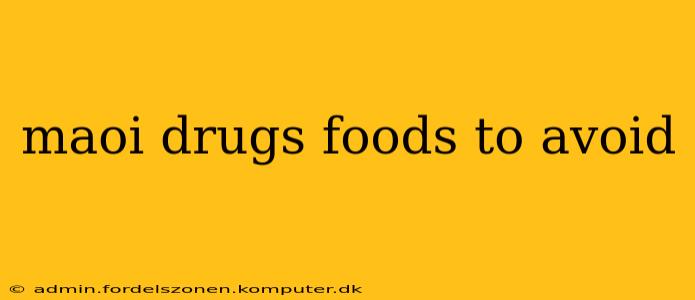MAOI Drugs: Foods to Avoid for a Safe and Healthy Lifestyle
Monoamine oxidase inhibitors (MAOIs) are a class of medications primarily used to treat depression, Parkinson's disease, and some other neurological conditions. While highly effective for some, MAOIs require careful attention to diet due to potential interactions that can lead to a dangerous surge in blood pressure, a condition known as a hypertensive crisis. Understanding which foods to avoid when taking MAOIs is crucial for maintaining health and safety.
This guide will help you navigate the complexities of MAOI dietary restrictions, answering common questions and providing clear, actionable advice. Remember, always consult your doctor or pharmacist before making any changes to your diet or medication regimen. They can provide personalized guidance based on your specific needs and health status.
What are MAOIs and why are dietary restrictions necessary?
Monoamine oxidase (MAO) is an enzyme that breaks down certain neurotransmitters in the brain and body. MAOIs work by inhibiting this enzyme, leading to increased levels of these neurotransmitters, which can improve mood and alleviate symptoms of depression and other conditions. However, this same enzyme also plays a role in breaking down tyramine, a compound found in many foods. When tyramine isn't broken down effectively due to MAOI medication, it can accumulate in the body, causing a rapid increase in blood pressure. This is why adhering to a specific diet while on MAOIs is vital to prevent potentially life-threatening complications.
What foods contain high levels of tyramine and should be avoided while taking MAOIs?
This is a crucial question and requires careful attention to detail. High-tyramine foods generally fall into the following categories:
- Aged cheeses: Cheddar, Swiss, Parmesan, provolone, and most other aged cheeses are high in tyramine. Fresh, unaged cheeses are generally safer in moderation.
- Cured meats: Salami, pepperoni, sausage, bacon, and similar cured meats should be avoided. Freshly cooked meats are usually acceptable.
- Fermented foods: Pickles, sauerkraut, soy sauce, and other fermented products contain significant amounts of tyramine.
- Smoked or pickled fish: Smoked salmon, herring, and similar preparations are generally not recommended.
- Certain beverages: Alcohol, especially red wine and beer, is often high in tyramine and should be limited or avoided entirely. Some tap beers can also contain high tyramine levels.
- Avocados: While nutritious, avocados contain a moderate amount of tyramine and should be consumed sparingly or avoided altogether.
- Bananas: Overripe bananas should be avoided; ripe bananas in moderation are generally tolerated.
- Certain beans: Fava beans and broad beans contain high tyramine levels and should be avoided.
- Chocolate: Dark chocolate, particularly in large amounts, should be limited or avoided.
It's essential to remember that this list isn't exhaustive. The tyramine content of food can vary based on factors like processing, storage, and age. Always check food labels and consult your doctor or a registered dietitian for personalized guidance.
Are there specific foods I can safely eat while taking MAOIs?
Yes, there's a wide range of foods that are generally safe to consume while on MAOI therapy. These typically include:
- Fresh fruits and vegetables: Most fresh fruits and vegetables are low in tyramine and are generally safe.
- Freshly cooked meats and poultry: Ensure meats are cooked fresh and not cured or processed.
- Freshly baked bread and pastries: Avoid those with aged cheese or fermented ingredients.
- Most dairy products (excluding aged cheese): Milk, yogurt, and cottage cheese are usually fine.
- Most grains and legumes (excluding fava and broad beans): Rice, pasta, and most beans are generally acceptable.
Again, moderation is key. Even low-tyramine foods can accumulate over time and contribute to a build-up of tyramine in the body.
What are the symptoms of a hypertensive crisis due to MAOI and tyramine interaction?
Recognizing the symptoms of a hypertensive crisis is crucial. These can include:
- Severe headache: Often described as the worst headache of your life.
- Stiff neck: Muscle stiffness in the neck region.
- Rapid heart rate: An abnormally fast heartbeat.
- Nausea and vomiting: Gastrointestinal distress.
- Elevated blood pressure: This is a primary indicator.
If you experience any of these symptoms, seek immediate medical attention.
Can I eat out while taking MAOIs?
Eating out while taking MAOIs requires extra caution. Be sure to inform restaurant staff about your dietary restrictions and ask specific questions about ingredients and preparation methods. Choosing restaurants serving fresh, simply prepared dishes reduces your risk of accidentally consuming high-tyramine foods.
This information is intended for educational purposes only and is not a substitute for professional medical advice. Always consult your doctor or pharmacist before making any changes to your diet or medication regimen. They can provide tailored guidance to ensure your safety and well-being while on MAOI medication.
